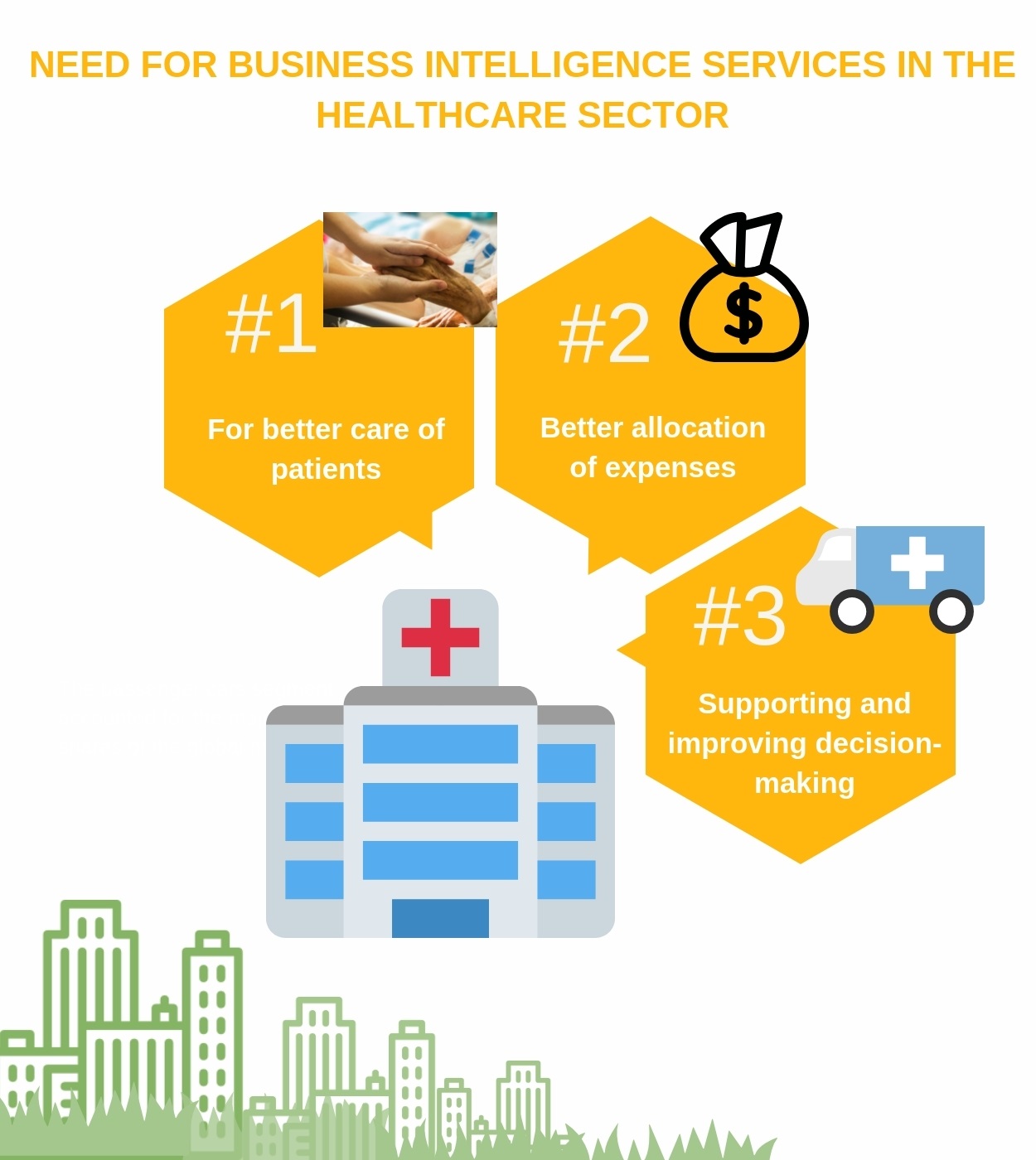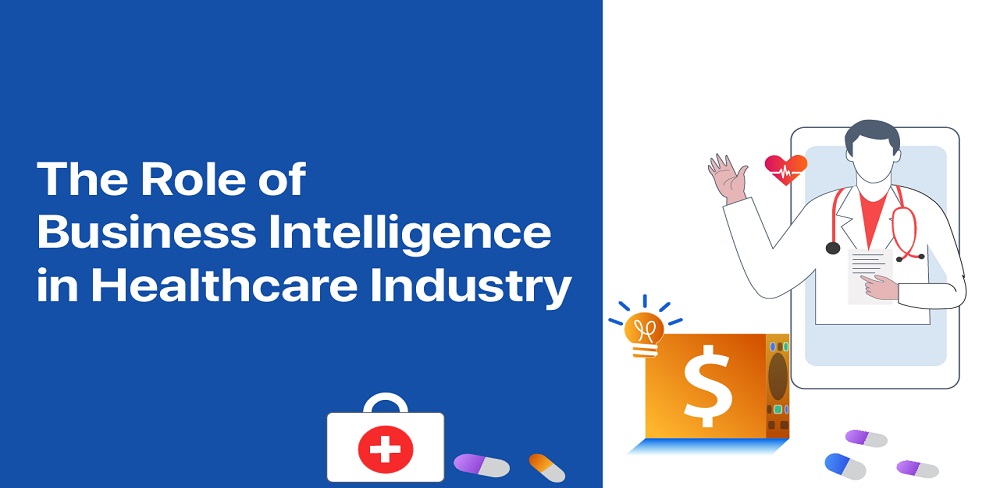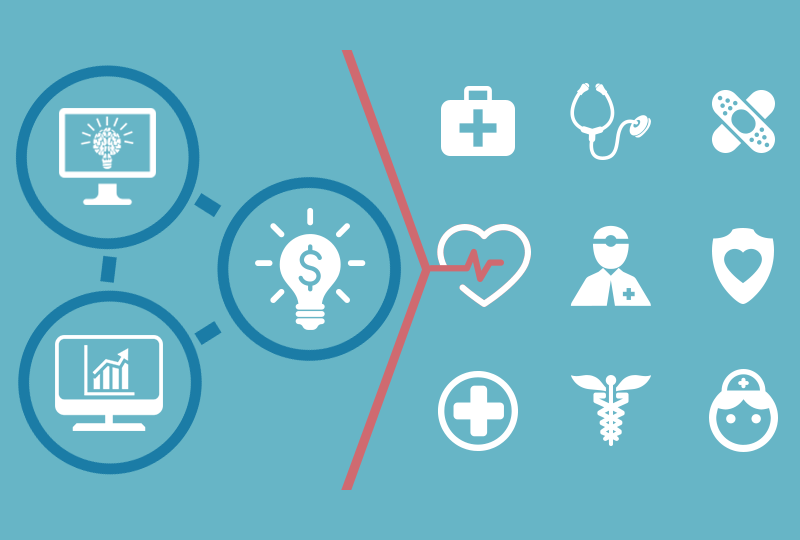Today, the healthcare industry is becoming more reliant on data, and hence BI or Business Intelligence is becoming vital in enabling healthcare professionals to make informed decisions and streamline operations.
Business Intelligence in healthcare encompasses using various tools and technologies to acquire, store, and analyze data to obtain valuable insights. Therefore, more and more business intelligence software in healthcare is being adopted by healthcare providers. Reports state that the healthcare BI market is projected to grow at a CAGR of 14.05% by the end of 2027.
Despite the immense popularity, many professionals aren’t well-versed with the role and benefits of business intelligence in healthcare. So, this blog highlights everything about BI in healthcare. Let’s explore…
What Is Business Intelligence in Healthcare?

BI in healthcare refers to using the latest technologies and practices to store, process, and analyze healthcare data from multiple sources, including EHRs, medical devices, and patient-generated data.
The goal of business intelligence (BI) is to offer healthcare organizations valuable insights and information. It further helps them to optimize their operations, improve patient outcomes, and reduce costs.
The process of business intelligence in healthcare industry involves data visualization, dashboards, reporting, and predictive analytics for real-time data analysis. One of the major benefits of business intelligence in healthcare is it helps healthcare professionals identify trends, patterns, and correlations to make informed decisions and drive better outcomes.
The sudden rise in real-time data reliability in the healthcare industry has raised the demand for business intelligence development company to a great extent.
The Importance of Business Intelligence in Healthcare Industry
Business Intelligence was coined in 1865, and now almost every industry plans to incorporate BI software. So, if we talk about 156 years later, it is impossible to imagine a life without BI software. As stated below, the healthcare business intelligence solution will hold immense importance in the coming time.

1. Improve Patient Outcomes
Business Intelligence solutions help healthcare IT industry identify trends and patterns in the healthcare industry that helps to improve patient outcomes. By analyzing data from EHRs and other sources, BI can help identify patients at risk of complications, enabling proactive interventions to be taken.
2. Cost Reduction
Business Consulting helps organizations identify their areas of inefficiencies, which results in cost reduction. Using Business intelligence in healthcare, businesses can identify opportunities to streamline operations and reduce costs.
3. Real-time Decision Making
When you seek BI consulting services, you can ensure real-time data analysis, enabling healthcare professionals to make informed decisions. Healthcare organizations can respond to emergencies and rapidly changing situations by analyzing data in real-time.
4. Patient Health Management
BI software helps healthcare organizations manage patients’ health and analyze their data and history from multiple sources. As per the AI development company professionals, BI software helps healthcare organizations implement preventive measures to reduce the prevalence of these conditions.
5. Drive Business Growth
BI software helps to analyze market trends and customer behaviour that ultimately help businesses identify new healthcare business opportunities. It will result in driving improved business growth and success.
How to Develop BI-based Healthcare Software?
If you plan to include business intelligence in healthcare and want to know the development process, here is the step-by-step process you can follow.
#Step 1 – Define Your Project Requirements
First, identify the requirements to develop a BI-based healthcare software, including the data type and sources gathered. Analyzing the healthcare app requirements in the first stage will result in smooth healthcare app development.
#Step 2 – Pick the Right Tools & Technologies
Whenever we develop any application or software, choosing the right tech stacks is crucial to ensure the application’s success. As per the business intelligence development services experts, accurate tech stacks can add more worth and value to BI software. It includes data visualization tools, analytics software, and database management systems.
#Step 3 – Decide App Features & Functionalities
Next, decide the features and functionalities of the business intelligence software in healthcare. The features of BI software in healthcare will help to make a healthcare app unique and revenue-generating. Also, deciding the functionalities will result in successful on-demand doctor app development, so think about it.
#Step 4 – Add Data Architecture & Analytics Capabilities
Create a robust data architecture that can handle the complexity and volume of your healthcare data. It includes designing data models, data storage, and integration processes. Besides this, data analytics will help you support different types of analysis the healthcare organization requires.
#Step 5 – Begin BI Software Development
Once you gather all the essential data and information about implementing business intelligence in the healthcare industry, it is time to begin the actual healthcare software development process. Here, you will require experts. So, either connect with a business intelligence development company or hire BI developers.
#Step 6 – Test & Validate BI Software
When the healthcare software is successfully developed, test the app against all the errors and bugs to ensure seamless performance. Accurate testing improves data accuracy, high performance, and better scalability.
#Step 7 – Launch & Maintain Your App
Finally, launch your healthcare application on the desired platform either yourself or with the support of business intelligence healthcare services. To ensure long-term success, you can use mobile app support & maintenance services. If you lack expertise, hire business intelligence software developers from a leading firm.
It is a simple step-by-step healthcare app development process of business intelligence solutions. Keep these steps into consideration while planning to develop healthcare software.
3 Real-life Examples of Business Intelligence in Healthcare Industry
If you are still wondering about the major benefits of business intelligence in healthcare sectors, refer to the real-life examples below.
1. Analyzing Patient Data & Identifying Trends
Help healthcare providers better understand the patients’ changing needs while offering them more targeted and personalized care.
For instance, being a healthcare professional, you can use business intelligence to identify trends and patterns, pinpointing groups of patients with uncertain health conditions. Later, the experts can take proactive steps to prevent or improve patients’ health.
2. Analyzing Data on New Treatments & Medications
Using business intelligence in healthcare enables businesses to identify new opportunities for research and development.
For instance, by utilizing BI, a pharmaceutical company can examine data on the efficacy of various medications for specific conditions. The data gathered can further be utilized to pinpoint prospects for enhancing existing drugs or creating new ones.
3. Analyze Information About Public Health Trends
Previously, identifying the spread of infectious diseases was very challenging, but not anymore. Now, with the help of business intelligence in healthcare, experts can analyze data to better understand and address public health issues.
For instance, public health departments utilize BI to evaluate information on the propagation of particular infectious diseases, enabling them to take necessary steps to intervene and curb the further spread of the disease.
Read More:How to Develop a Successful BI Strategy For Your FinTech Business?
Implementing BI Strategy in Healthcare Software Development
Do you want to implement a business intelligence strategy during healthcare software development to withstand competition? If yes, then refer to the following step-by-step process for BI strategy implementation.
Step 1 – Define the Current State
A stable BI strategy is the foundation for ensuring successful healthcare app development. So, to gain the full potential of business intelligence in healthcare, it is a must for healthcare experts to define the current state.
But, ensure there should always be a precise alignment between your BI strategy and the organization’s strategy.
Step 2 – Build a Business Intelligence Roadmap
Always remember that a strong BI strategy starts with a solid plan. So, the next step is to build a business intelligence roadmap. The documentation or roadmap should clearly outline your business vision, goals, and the best ways to achieve them.
Having a clear roadmap, in the beginning will act as a saviour during your healthcare app development journey.
Step 3 – Set KPIs & Requirements
Now comes the stage where you need to define the healthcare business goals. So, implementing the right BI strategy is the only way to achieve those goals. Hence, as per the ML development services experts, setting up key performance indicators (KPIs) and other project requirements is necessary.
But, for that, you must have a clear healthcare business goal in mind, and then only you can implement the right BI strategy for the healthcare business.
Step 4 – Choose a Qualified BI Tool
Evaluating company size and business needs and conducting market research is essential to improve business growth. For that, a BI tool comes in handy. When you use business intelligence in healthcare, make sure to have the right tool in place so that you can accurately get the business data and work accordingly.
For instance, you can use famous BI tools like FineBI and FineReport.
Step 5 – Create a Prototype
It is time to create a prototype for validating your technical concept, such as proposing simplified functions, testing healthcare software functionalities, and ensuring concept implementation. Additionally, it helps businesses find the data source, and when the end-users access the information, BI can perform some transformations to ensure data safety and security.
Step 6 – Set Up a Team
Finally, establishing a strong team is the last step to creating a BI strategy for your healthcare project. You might need BI engineers, business analysts, BI directors, and developers for healthcare app development BI strategy. For better assistance, you can connect with top business intelligence development services experts, who will help you set up the right BI strategy for the healthcare app. You can also consult the experts of a leading healthcare app development company.
Why You Must Implement Business Intelligence in Healthcare industry?
There is one of the most common questions that strike every healthcare business owner’s mind, i.e., ‘Why will I need business intelligence strategy for my healthcare businesses?’ So, here are the major reasons justifying the importance and benefits of BI in healthcare.
1. Data-driven Decision-making
A strong BI strategy enables healthcare businesses to make data-driven decisions. It should be solely based on insights gleaned from their data, resulting in informed and accurate decisions. All this leads to better outcomes for both the patients and the healthcare business.
2. Regulatory Compliance
Healthcare businesses must comply with multiple rules and regulations, including HIPAA. It requires the collection, storage, and handling of patient data securely. It is where having a strong BI strategy can help businesses ensure to meet regulatory compliances well.
3. Improved Patient Outcomes
The BI strategy enables healthcare businesses to identify trends and patterns in analyzing patient data. It allows healthcare professionals to provide more personalized and effective care, leading to improved and satisfactory patient outcomes.
4. Operational Efficiency
Offline data handling always leads to mismanaged healthcare operational efficiencies. Hence, the BI strategy helps identify inefficiencies in healthcare workflows and processes, enabling healthcare experts to optimize their operations and reduce costs. Businesses prefer seeking business intelligence healthcare services rather than managing everything independently.
5. Competitive Advantage
Healthcare businesses leveraging BI strategy to gain data insights and make informed decisions can get a competitive advantage over those who don’t. It enables businesses to stay ahead of the competition and helps them achieve long-term business success.
Overall, a strong BI strategy is essential for all healthcare businesses and other industries to remain competitive and ensure regulatory compliance.
Summing Up!!!
To conclude, business intelligence in the healthcare industry is playing a significant role as everything has gone digital today. So, while implementing the right BI strategies, businesses can ensure accurate patient data management, better outcomes, and other data sources that help improve patient care and drive business growth.
So, do not think about whether to implement BI in healthcare; instead, go for it. Connect with a leading business intelligence development company or hire business intelligence software developers who can help you with that. A step towards advancing digital presence in your healthcare business will help you lead a better tomorrow.
FAQs on BI in Healthcare
What Is the Cost to Implement BI Strategy in Healthcare?
As per the BI consulting services experts, the cost to implement a BI strategy in healthcare can vary depending on several factors, including the organization’s size, the data complexity, and the project’s scope. So, when you hire business intelligence software developers for your project, the experts will help you get an exact cost estimation.
What Are the Benefits of Business Intelligence in Healthcare?
Implementing a strong business intelligence strategy in healthcare brings multiple benefits to the healthcare industry, such as –
- Improved patient outcomes
- Competitive benefits
- Better decision making
- Operational efficiency
What Is Business Intelligence?
Business Intelligence (BI) collects, stores, analyses, and represents data that helps businesses make informed decisions. A BI strategy allows organizations and businesses to identify trends and patterns in their data, which helps to improve performance, reduce costs, and achieve success.
































